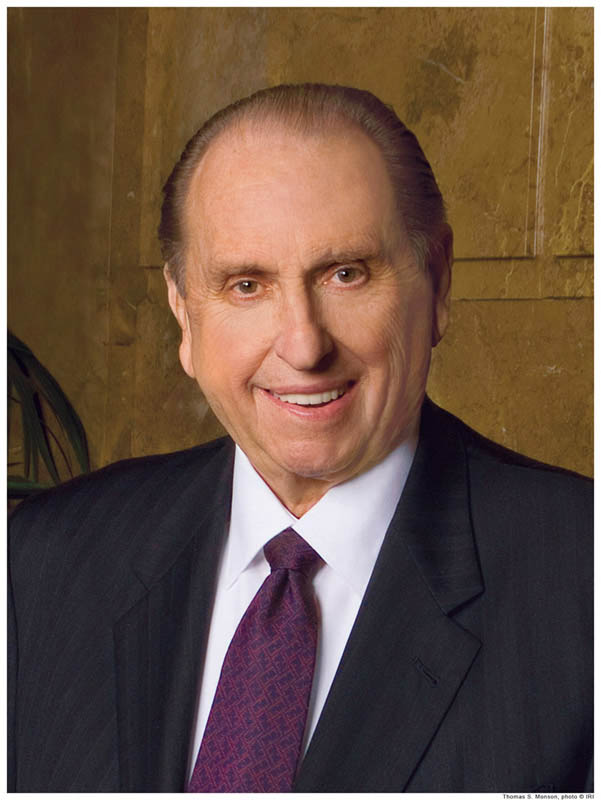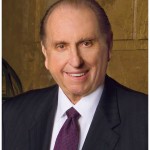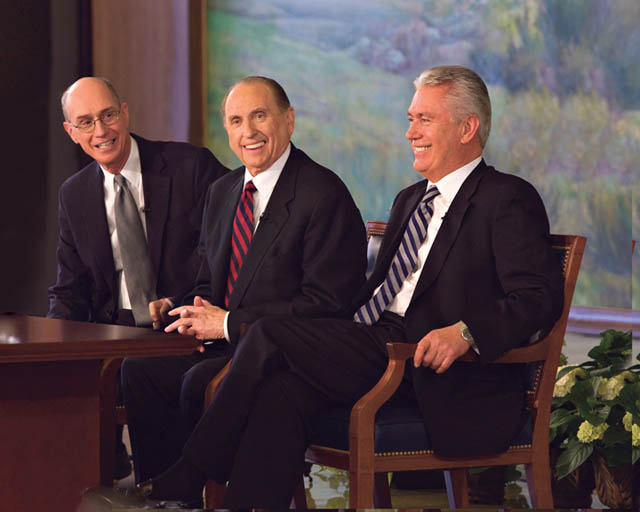This is the final article in the series on Mormon prophets. It has been based on a talk given by Ezra Taft Benson, who was then a Mormon apostle and who later became the Mormon prophet. In the article, he outlines Fourteen Fundamentals in Following the Prophet.
The final two fundamentals in following a prophet are:
13. The prophet and his counselors make up the First Presidency—the highest quorum in the Church.
14. The prophet and the presidency—the living prophet and the First Presidency—follow them and be blessed—reject them and suffer.
The Mormon prophet is also the President of the Church, just as prophets were in ancient times. He is assisted by two counselors. Together, they form the First Presidency and are the highest governing body of the Mormon Church. The First Presidency works with the Quorum of the Twelve Apostles to run the Church. In this article, we’ll explore how the leadership of the Mormon Church works and why it matters that it works this way.
When the Savior was on the earth, He chose twelve apostles to help Him in His ministry. He knew His life would end in just a few years, and this foundation would protect the church for a few more years while it grew in numbers that would allow Christianity to continue to the present time.
The Apostle Paul explained in Ephesians chapter 4:
11 And he gave some, apostles; and some, prophets; and some, evangelists; and some, pastors and teachers;
12 For the perfecting of the saints, for the work of the ministry, for the edifying of the body of Christ:
13 Till we all come in the unity of the faith, and of the knowledge of the Son of God, unto a perfect man, unto the measure of the stature of the fulness of Christ:
14 That we henceforth be no more children, tossed to and fro, and carried about with every wind of doctrine, by the sleight of men, and cunning craftiness, whereby they lie in wait to deceive;
15 But speaking the truth in love, may grow up into him in all things, which is the head, even Christ:
So the purpose of the apostles was to protect the church and keep us from being lost by the confusion of false doctrine. It wasn’t until they were all dead that the apostasy began, and the members of the small church were “carried about with every wind of doctrine.” We have apostles when the risk is great, as we saw in the previous scripture. Today, the risk is great as we prepare for the final days of earth, and we need apostles more than ever.
What is an apostle? The word means “One Sent Forth.” Specifically, they are sent forth to bear witness of the Savior.
Joseph Fielding Smith said, “All men may, by virtue of the priesthood and the gift of the Holy Ghost, become witnesses for Christ. In fact that is just what every elder in the Church should be, but there is a special calling which is given to the Twelve special witnesses that separates them from other elders of the Church in the nature of their calling as witnesses. These twelve men hold the fulness of authority, keys, and priesthood, to open up the way for the preaching of the gospel to every nation, kindred, and tongue. Others who go forth go under their direction and are subject unto them. This work of proselyting is in their hands, and under the counsel of the First Presidency they are called upon to conduct all the affairs of the Church and the preaching of the gospel to every creature.” (Doctrines of Salvation, 3:146.)
This calling does not mean the apostles are equal to the prophet. The prophet holds all the keys. He heads the church. The apostles also hold all the keys, but they can’t use them without an assignment from the prophet. He can delegate some of the keys to his apostles as needed, but he is always in charge. The apostle uses only the keys currently assigned to him by the prophet. The key isn’t a literal key. It’s a symbol meaning authority. He has the authority to do whatever he’s assigned to do and he has the right to receive the revelation and inspiration necessary to carry out the assigned duty—just as you do in your own callings.
Now there is one time when this pattern changes, and we’ve seen this situation recently. When President Hinckley died, the first presidency was dissolved. There was no longer a president of the church, and his counselors were automatically released, so there weren’t counselors either. Who was running the church? At the moment of death, the quorum of the Twelve Apostles automatically becomes the ruling body of the church. They run the church as a group until the new prophet is chosen.
What is a prophet? Elder Harold B. Lee taught that “in a broad sense, a prophet is one who speaks, who is inspired of God to speak in his name.”
“Every member of the Church should be a prophet as pertaining to his own affairs. ‘Would God that all the Lord’s people were prophets, and that the Lord would put his spirit upon them!’ was the prayer of Moses. (Num. 11:29.) Prophecy is one of the gifts of the Spirit to which all the saints are entitled (1 Cor. 12:10), and faithful members of the Church are exhorted to ‘covet to prophesy.’ (1 Cor. 14:39.)
“Those who hold offices in the Church, however, should be prophets both as pertaining to their own affairs and the affairs of the organization over which they preside. . . . Members of the First Presidency and Council of the Twelve . . . are all sustained as prophets, seers, and revelators to the Church. Any new revelation for the Church would, of course, be presented to the people by the President of the Church, he being the mouthpiece of God on earth. (D. & C. 21:1–7.)” (Mormon Doctrine, p. 606.)”
So, each of us is entitled to revelation for our own lives, our families, and our callings. We have as much right as a prophet to receive revelation, as long as that revelation is about something for which we are responsible. Only a prophet is responsible for official doctrine, however.
A prophet might foretell the future if it’s needed, as Noah did, for example, when he warned the people there would be a flood if they didn’t repent. Most often, though, he is testifying of the Savior and helping us to recognize and understand truth, under direction from God.
The apostles are all called as prophets, seers, and revelators, operating under the direction of the president of the church. They are witnesses of the Savior, and they also, by the very nature of their callings, give us another important message, one the world is desperate to hear.
Their message is that God is alive. He’s aware of us, and He’s an active participant in our lives today. So many people don’t believe that. I don’t just speak of atheists. People who believe in God often aren’t sure He is still paying attention. They wonder why God had so much to say to the people who lived in the beginnings of time, and nothing at all to say to those of us who live in the end of times. They don’t know God is still talking to us, still putting the gospel into the context of a world that has dramatically changed since Biblical Times, that He’s as involved in our lives now as He was in the days of Moses.
Ralph Waldo Emerson, one of the great philosophers of the 1800s, said to the Divinity School at Harvard: “It is my duty to say to you that the need was never greater [for] new revelation than now.” “The doctrine of inspiration is lost. … Miracles, prophecy, … the holy life, exist as ancient history [only]. … Men have come to speak of … revelation as somewhat long ago given and done, as if God were dead. … It is the office of a true teacher,” he warned, “to show us that God is, not was; that He speaketh, not spake.”
Believing that God is unwilling to talk to us now causes people to feel distanced from God. They feel like God is far away, not paying attention, not interested in their own lives. This make it difficult for them to build a loving and personal relationship with their Father in Heaven. Modern day prophecy sends a different message than the one the rest of the world sends to them. It teaches us God is alive and well, and paying attention. This discovery changes lives. It makes God real and close by. When God is real, when we know He’s paying attention, it’s so much easier to find joy in our lives.
Everything changed the day a fourteen year old boy named Joseph Smith knelt down in a grove of trees to ask God what church to join. Joseph learned that day that God was paying attention, even to the prayers of a teenage boy, and he later was given the opportunity to teach us that God is listening to the prayers of every person. Because God talks to prophets, we know He is aware of the complications of our modern world and we know He is helping us through them. That gives us reassurance that we, as individuals, also have God’s attention when we need it.
Prophecy, at any level, is a comfort. The world is confusing, and it’s impossible for any one person to figure out every single truth. Often when people set out to decide what they believe, they try to make lists of all the doctrine they know of, and then they try to figure out if each individual possibility is true. Essentially, they try to create their own religion, and that’s a lot of work, and of course, extremely likely to result in mistakes.
What if you could ask one question, and that question gave you all the answers you needed? This is what the prophets and apostles have given us. We can ask one question: Is the Church of Jesus Christ of Latter-day Saints true?” Then we can get an answer, maybe not immediately, but with time, study, and faith, we can get it. God promised that in James 1:5: If any of ye lack wisdom, let Him ask of God.” Once we have the answer to that single question, we have the answer to every question we could ever ask. We aren’t giving up our right to choose for ourselves. We’re only finding out where God put all the answers, and then going there to get them.
There are fifteen men on the earth who know without question that God lives, that Jesus was the Savior, that the Church is true. These men—the prophet, his counselors, and the apostles are our guaranteed source of truth. As we listen to them speak in General Conference, and as we read their words in the church magazines, we can learn everything we really need to know about the gospel and know the information comes from someone who knows, really knows, what is true.
About Terrie Lynn Bittner
The late Terrie Lynn Bittner—beloved wife, mother, grandmother, and friend—was the author of two homeschooling books and numerous articles, including several that appeared in Latter-day Saint magazines. She became a member of the Church at the age of 17 and began sharing her faith online in 1992.







